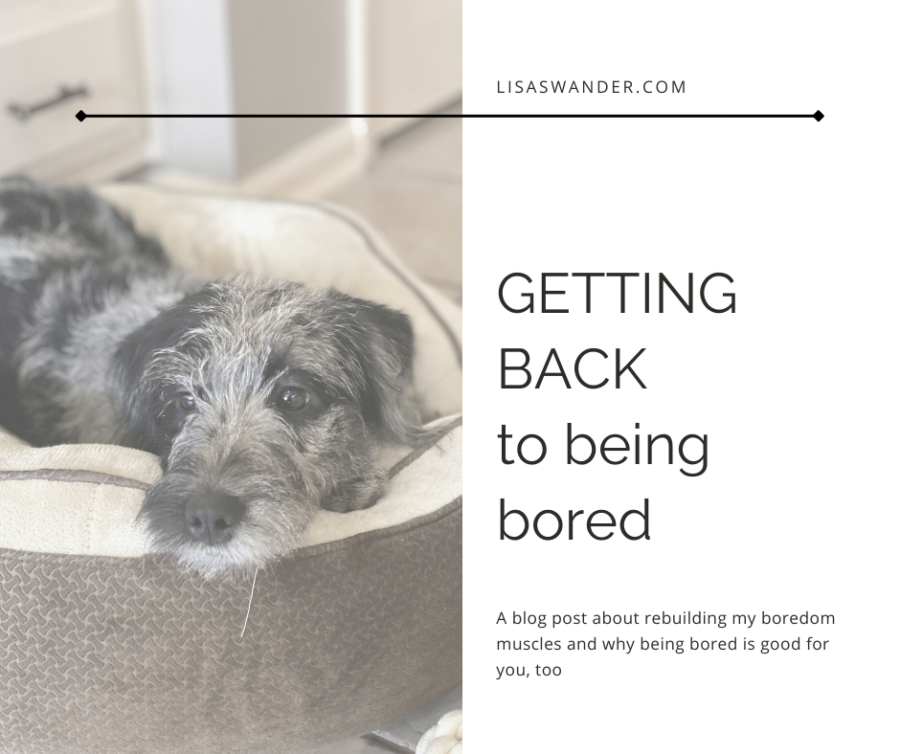For the past couple of weeks, I tried being bored.
It took some work.
Over the past year, the lack of structure in my work-from-home-life (which is to say, my life) has formed an inverse relationship with my tolerance for boredom. The more free time I have, the less I can stand not filling it with something.
And like you, I’m mostly filling it with my phone.
Some of that is FOMO. There is just so much content available, and when every single person you like has a podcast, you’re either listening in the shower or you’re getting behind. All the authors I read have Instagram feeds and Twitter thoughts. There are seventeen thousand prestige television shows on Netflix I’ve been meaning to watch. Oh, and then there’s the news, which I can ignore for a few hours only if I don’t mind missing cataclysmic shifts in pandemic protocols.
Some of it is also self-improvement guilt. My phone can teach me to speak Italian, keep my plants alive, and choreograph an Olympic figure skating routine, if only I will make the time for it. I should be caught up on current events! I should be caught up on classic novels! I should be caught up on JavaScript and brewing artisanal kombucha BECAUSE IT’S THERE AND I CAN.
And then there’s the rest of it, which is just a weak set of boredom muscles.
They’ve atrophied over the years. I went from a childhood spent staring out car windows and talking to squirrels and being fantastically and regularly bored, to an adulthood watching Dan Levy interviews while I walk from one room of my house to another.
As a kid, I was used to playing small bursts of mental offense. It was the late 80s, we didn’t have a Game Boy, and our television weighed as much as a beer refrigerator. The only entertainment being carried from room to room was my brain, and so if I wanted to experience something interesting as I roamed the house, I had to make it up myself.
Now I have this phone with me all the time. So now I mostly play defense.
I realized this while listening to an episode of On Being—yes, yes, irony and such—when Tiffany Schlain, creator of the “Tech Shabbat” movement, said all we do on our devices is react and respond.
That would be me. Since the pandemic started, I’ve been spending most of my mental energy responding to other people’s thoughts. As soon as I consume a tweet or TED talk or an interview answer, I have to evaluate, file or dismiss it, and that sucks up cognitive bandwidth. Bandwidth I could have been using not to react, but to create.
Constantly ingesting information means I have to spend equal energy digesting it. And just as I can’t run a mile after eating a lasagna for lunch, I can’t create new ideas after scrolling Twitter for 45 minutes.
The phone, to mix all these metaphors, has me backpedaling with noodly arms and a stomach full of ricotta cheese. I don’t pretend to know much about sports, but from what I have gathered from Space Jam, that is not a recipe for victory.
So for the past couple of weeks, I’ve been trying to reclaim my bored spaces. I put the headphones and podcasts away while cooking dinner, folding laundry, and taking walks. I turned off NPR in the car. I moved my phone charger out of my bedroom. I kept a sticky note on my desk titled “Didn’t Check Instagram” and put a tally mark every time I resisted.
And, of course, it made me feel better.
It also made me work better. I wrote my way out of a plot corner and even thought of a title for my novel, which for the past nine months has been called Untitled Amazing Novel. Oh, and I wrote, by hand, pages and pages of ideas I’ll probably never use but that needed to come out of my head anyway, because they’re mine.
I am not the first to discover this. Boredom gets a bad rap, but as long as you can tolerate it without eating gallons of ice cream or drag racing to erase it, it has clear benefits for mental and emotional health.
So if you, too, are stumbling out of COVID life a little foggy, anxious, or defensive, and if you, too, like to scroll the entire internet while waiting for your tea to steep, you might try a little boredom. Then you can get creative, and look, we need you to get creative.
I’m not just talking watercolors and interpretive dance. Creativity is also cooking up the solutions to very practical problems, and since 99% of my audience is humans (I am also very popular with CBD gummy bots), I’d guess you have one or two of those.
Reaching a difficult kid, reigning in a disorganized coworker, writing the perfect proposal, STEMMING THE CLIMATE CRISIS—all of these require creative thought. One of us, or maybe all of us together, might be able to solve them, if we can stand to get back to being bored.



1 comment
Comments are closed.